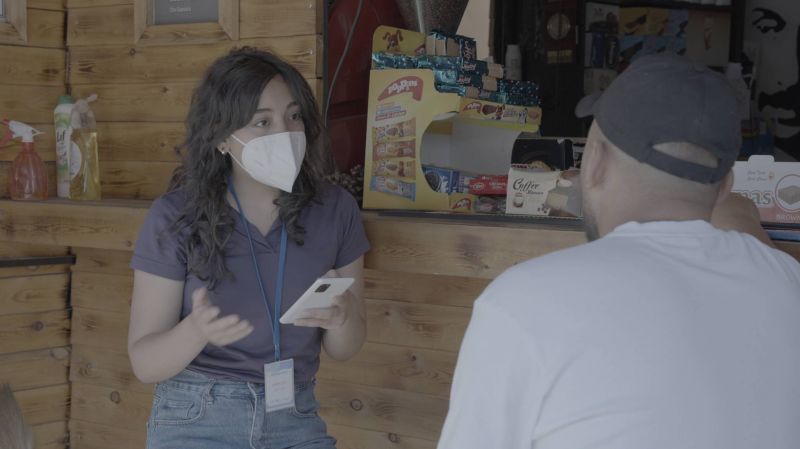
A Youth4Governance volunteer takes a survey in Bar Elias, Bekaa. (Taymour Boulos/Youth4Governance)
BEIRUT — A World Bank-funded government cash assistance program that began giving aid to impoverished households earlier this year has been largely successful in reaching the poorest families, a survey conducted by a group of university students found.
However, the study found that many impoverished households did not register for the aid because they did not know it existed. Elderly people, in particular, were most likely to have been passed over.
Out of some 1,328 people across Lebanon who were surveyed, only 5.34 percent received aid through the Emergency Social Safety Net (ESSN) program.
The field research was conducted by 23 students and recent graduates with the Youth4Governance program, an internship program run by Saint Joseph University, the government’s Central Inspection agency, and Siren Associates — a UK registered not-for-profit company with headquarters in Lebanon. Siren Associates developed the online registration platforms used by the Lebanese government for COVID-19 vaccine distribution and the ESSN program.
The surveys were conducted in 18 districts around Lebanon, but teams were unable to include Baalbeck, Hermel, Nabatieh and Bint Jbeil “due to difficulty of access,” the report noted.
“The ESSN social assistance program was generally effective in reaching the most extreme poor,” the report states. Among those who received aid through the ESSN program, 64.4 percent said their financial situation had improved as a result of the assistance.
However, more than half of those surveyed did not even apply for aid; 35 percent of those who did not register said they were unaware that the program existed. Another 14 percent did not register because they believed that the process was corrupt, 8 percent had technical difficulties and 4 percent said they “lack technical means.”
While the program appears to have been successful in reaching some categories of vulnerable people — female-headed households and households with children and people with disabilities were more likely than the general population to receive aid — it seems to have passed others over, particularly the elderly with no children at home.
Funded by a $246 million World Bank loan, the ESSN was launched in December 2021 after months of delay due in part to bureaucratic missteps, including alterations to the loan agreement that were made by Lebanon’s cabinet and Parliament without the Bank’s approval.
The ESSN, also known as the “Aman” program, was intended to offset the impacts of the country’s ongoing economic crisis for some 150,000 of the country’s poorest households. It provides monthly transfers of $20 per household member up to six members, in addition to a flat sum of $25 per household. To date, 67,936 households are receiving assistance.
The students surveyed 55 households with two members over 64 years of age. “None of these 55 cases received aid … Two thirds of these households were not registered,” the report noted.
The survey found 91 percent of unregistered households with elderly people met the criteria for assistance: “This confirms that elderly are in need of outreach and better targeting in order to get the support they need.”
The report recommended the Ministry of Social Affairs “consider field testing outreach methods prior to launching assistance programmes, including hybrid outreach models of both offline and online methods. Offline outreach, including door to door registration for the elderly, could help increase registration rates.”
A spokeswoman for the ministry could not immediately comment on the report’s findings.
George Attieh, a judge and head of Central Inspection, spoke at an USJ event unveiling the report’s findings and said the youth involved in the program took a step toward “achieving the state we dream of” by helping to bolster the flagging public sector.
“We can’t do substitution, we can’t put NGOs in the place of state institutions. The state must be the base, the hub that gives services to the people,” Attieh said.
Carole Alsharabati, research director at Siren Associates and professor of political science at USJ, said the students’ research suggests ESSN’s money is going to the right place, for the most part.
“The student didn't come back with cases where they said that they met unqualified people who are receiving aid,” she told L’Orient Today, although she acknowledged the small sample size of the study.
Beyond the survey findings, Alsharabati said the research demonstrated the importance of involving young people in the rebuilding of the public sector, as Lebanon attempts to dig out of this deep hole.
“I think the most important message here is that we cannot bring about reform without putting the youth in the center,” Alsharabati said. “The way that now things are set up, they're outside the system, they're excluded, it's like a production for export. They study, they get their degree and then pack and leave, because they think there's no place for them here.”
Antoine Abi Rached, one of the Youth4Governance volunteers who graduated from La Sagesse University in the spring, said the experience gave him “a glimpse of hope.”
“While I'm still in Lebanon, I can work for the state,” he said. “And maybe I can be a part of the restructuring of the state.”